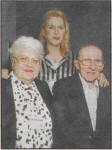Southern Comfort Calls for Transgender Pride (1999)

©1999, 2013 by Laura Brown
Source: Brown, Laura. (1999, 30 September). Southern Comfort calls for transgender pride. Southern Voice, p. 35.
I don’t have a scan of the second page of Laura’s article, but I did have the text.
Laura Brown’s Southern Voice Article (PDF)
Beyond Our Slave Names: My 1999 Keynote at SCC
Southern Comfort Calls for Transgender Pride
By Laura Brown
 Southern Comfort board member Stefanie Schumacher (center) introduced her parents, Gizella Schumacher, 79, and Charlie Schumacher, 72, who organized mailings for this year’s conference. Before Stefanie transitioned, “we loved her very much, and she hasn’t changed,” Gizella Schumacher said. “Naturally her body and her face have changed, but she has always been wonderful. When she was ‘he,’ she was wonderful, and now that she’s ‘she,’ she is wonderful … I gave birth to a loving child, and I still have a loving child.”
Southern Comfort board member Stefanie Schumacher (center) introduced her parents, Gizella Schumacher, 79, and Charlie Schumacher, 72, who organized mailings for this year’s conference. Before Stefanie transitioned, “we loved her very much, and she hasn’t changed,” Gizella Schumacher said. “Naturally her body and her face have changed, but she has always been wonderful. When she was ‘he,’ she was wonderful, and now that she’s ‘she,’ she is wonderful … I gave birth to a loving child, and I still have a loving child.”
Transgendered people from all over the country heard a call at last weekend’s Southern Comfort conference to “do away with the misery” that has been the hallmark of medical definitions of transsexualism and “set about redefining ourselves.”
“Transsexualism is rather like a country that has been colonized, … and the flag is the caduceus [medical staff],” longtime Atlanta activist Dallas Denny said Friday in a keynote address to Southern Comfort, the ninth annual transgender conference held Sept. 21-26 at the Sheraton Buckhead hotel.
“Physicians claimed the land of transsexualism about 40 years ago, and have owned it ever since. … Transsexual is a slave name, and we conspired in it,” said Denny, founder of the American Educational Gender Information Service.
“What I object to is not so much the name as what it means… To be transsexual, I must be miserable, hate my genitals, and be a knotted ball of rage,” she explained, noting that doctors at Vanderbilt University initially turned her down when she wanted to transition from male to female “because I wasn’t screwed up enough.”
“I didn’t hate my genitals—they were there, and what a strange thing for a woman to have on her body, but they were inappropriate, not hated,” she said.
Now, 10 years after her transition, Denny called on transgendered people to stop allowing themselves to be defined only by pain. “I feel gifted that I am transsexual……We don’t talk about what a magical journey it is and how we are social engineers,” she said.
Denny’s remarks, which earned a standing ovation, echoed a common theme for Southern Comfort attendees, who encompassed a broad spectrum of transgenderfrom occasional cross-dressers to male-tofemale and female-to-male tinssexuals.
The conference offered many .workshops on important practical issues facing transgendered people—everything from advice on hair and make-up, to presentations from physicians about hormone treatments and surgery, to ways to deal with the legal and employment issues raised by gender transition.
But a growing number of seminars and speakers also urged participants to work toward, as Denny put it, “building a community where people are judged not by what lies between their legs, but by what lies between their ears.”
New records set
Overall, this year’s Southern Comfort was an “incredible success,” setting new records for both total attendance and attendance at a single, seated event, according to Stefanie Schumacher, a member of the conference’s board of directors.
This year’s conference drew 600, a 20 percent increase over last year, Schumacher said.
Keynote speaker Dallas Denny called on transsexuals to “do away with the misery” and “set about redefining ourselves.”
Saturday night’s gala dinner, which included a performance by the Atlanta Gay Men’s Chorus, seated 450 and “was the largest single gathering of transgendered people we know of ever in modern history,” she said.
While last year’s conference drew a group of about five Bible-carrying protesters who shouted Bible verses at attendees outside of the hotel one night, this year’s Southern Comfort sparked “no protests at all,” Schumacher said.
Project launched for FTMs
Although Southern Comfort offered a full schedule of workshops, seminars, outings into Atlanta, and evening entertainment, what Schumacher described as “one of the most important things Southern Comfort 1999 did” wasn’t an event at all.
For the first time, Southern Comfort launched a Men’s Health Project designed to help female-to-male transgendered people get the gynecological health care many find extremely uncomfortable with mainstream physicians.
Organizer Lola Cola said she decided to start the project after her lover, Robert Eads, died of cancer in January.
“The fact is female-to-male transies are really abused by the medical profession, and they are refused treatment quite often,” Cola said.
“What really instigated all of this is my lover Robert was an FTM and he contracted uterine cancer and was turned away by 29 doctors and clinics before he found someone to treat him and then it was too late.
Cola said Men’s Health Project organizers worked with Alanta’s Feminist Women’s Health Center to set up a special evening for clinic visits during the conference where transgendered men could access health care without facing the awkward situation of a person who looks and sounds like a man asking for what are considered female procedures.
FWHC Community Service Director Janelle Yamarick said the center will now continue to offer routine gynecological services for female-to-male transgendered people.
